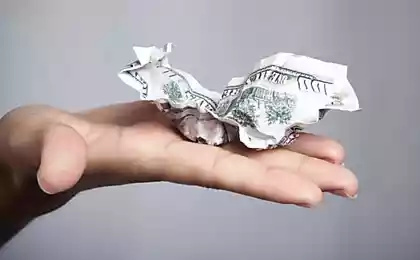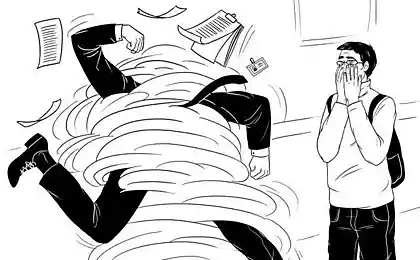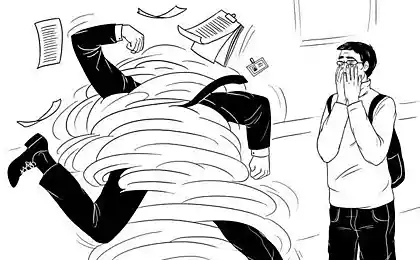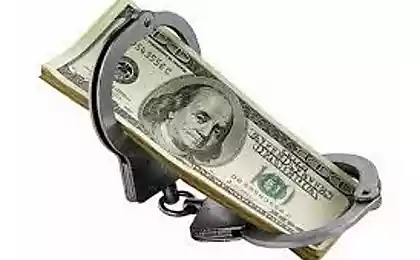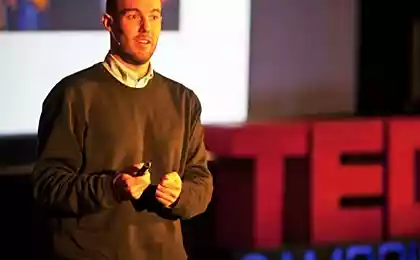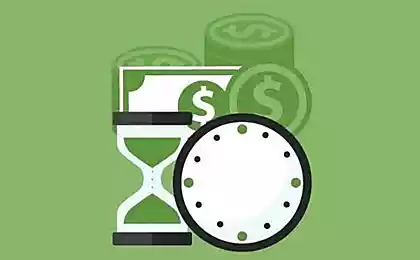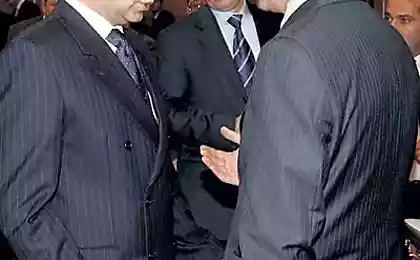273
How does life on credit affect a person?
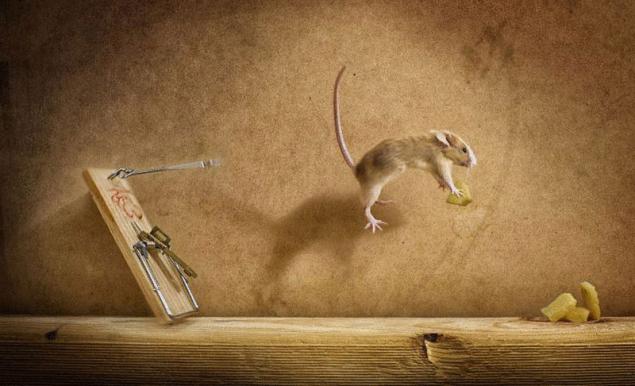
Interview with psychologist Wojciech Eichelberger, co-founder and director of the Warsaw Institute of Psychoimmunology.
Gazeta Wyborcza: Mortgage, car in installments, holiday loan. What happens to a person whose financial burden begins to outgrow?
Wojciech Eichelberger: When you said you wanted to talk to me about it, I used the definition of "extended stress." This is not a professional term, but it reflects the situation of a person who lives on credit and who is increasingly difficult to pay for it, because, for example, the Swiss franc has risen, wages have been reduced or the professional situation has deteriorated and you have to look for new part-time jobs. I'm not even talking about losing my job. Such a person is constantly subconsciously tense. It becomes irritable, impressionable, easily explodes.
- In what sense is this subconscious tension?
- In such a way that a person often does not remember himself, which caused tension. He is reluctant to communicate with people, especially those with whom he has some difficulties in relationships. Due to the fact that he is constantly irritated, contacts with others deteriorate.
- Close people too?
- Of course. He may become annoyed by a partner or partner because he is constantly reminded of the difficult situation they are in. If the family is mainly supported by him, then all responsibility lies with him. He can blame his partner for spending too much, make complaints to his children because they always want something. It might not even be about buying a new iPhone model, it might be that you need boots for the winter because the old ones are small, or a school backpack because the old one broke: What is it? Backpack again?!
This is a desperate attempt to control costs, to make everyone aware of the seriousness of the situation and to save money. Most families with loans have to learn to save, to prioritize. Perhaps give up vacations and shop at a less expensive store with a pencil in hand.
If the family is supported by both, their union begins to resemble a limited liability company, which in the first place must find funds to pay the debt and provide for daily expenses. Some unions are mobilized for joint efforts, but more often people do not stand: conflicts escalate, as neither partner has enough resources to be nice and understanding for the other half, children and pets. They live like a time bomb.
- How can children tolerate such an atmosphere when they constantly hear “We can’t afford this”, “Oh my God, they raised their rent again”, “A little more and they will take away our apartment”?
- They feel threatened and guilty. They may feel abandoned if their irritated and anxious parents don’t find time for them, much less want to hear about their problems. Children can stop talking about them, stop talking. To such an extent that at the end of the year, the news will fall like thunder from a clear sky that the child will not be transferred to the next class. There is nothing surprising here: children who are under stress do not absorb knowledge well.
- How does this affect relationships with friends and acquaintances?
- Such people are beginning to avoid companies, because now most meetings result in joint spending of money. Unfortunately, that's how it looks. People used to meet at home or drink vodka. There was enough tea, cookies, salt sticks. And now it is necessary to go to a restaurant, club, “for a cocktail” or go together on vacation abroad. The man who cannot afford it has no way out: he runs away and becomes a master of deception and finding excuses.
- Can't he just say, "I don't have money?"
- He's ashamed! And instead of saying, "Look, I'm not coming to your birthday party because I can't even buy a bouquet of flowers, let alone a bottle of wine, so I feel stupid," he looks for excuses: "colds," "children are sick," "a lot of important things."
- What happens if he confesses?
- It depends on the quality of these relationships: if they are real, deep, it doesn’t matter. Perhaps in this situation, the person will even receive support or comfort. After all, friends are known in trouble, and debts, indeed, can become a test for friendship.
- Isolation, irritation... What else?
- Living with chronic stress with no real prospect of it ending. Mortgage loans are 30-40 years of fear of bankruptcy, loss of a roof over your head, debts that will pass to innocent children. The house in which such people live ceases to be a pleasant place, an oasis in which you can relax. He becomes a stranger, even unpleasant. He does not want to return to it, because he reminds of a debtd purchase, and as if he repeats: “Pay, pay!” All this in the complex greatly reduces psychophysiological endurance.
- In what way?
- The body, functioning in a state of stress mobilization, ceases to recover. He can’t put his physiology in order and find balance. High levels of adrenaline are kept in the blood, which blocks the immune system so that all viruses, bacteria and free radicals multiply as they want.
- This is the physical level, but what happens on the psychological level?
- Same thing. An overstressed person loses the mental buffer that allows them to cope with situations other than a safe routine. If something happens that he's not ready for, something he doesn't like, he explodes. Therefore, such a person focuses on controlling reality and events, narrows the field of action, loses flexibility and creativity, functions as an automaton.
- How does that help him?
- It saves energy. Like in a car with an almost empty tank, which does not have the ability to quickly inventive driving. You have to drive as slowly as possible to get to the nearest gas station.
- The problem is that in this case, such a refueling is not visible. People who live on credit often say that even if they manage to carve out a minute for themselves, they do not manage to rest.
- How can they rest when the brain is constantly sending them a “threat” signal? In response, the body is constantly strained, preparing to fight or flee as if it were at war. Many begin to complain of insomnia, obsessive thoughts, inability to relax. And when they find a free moment, they feel guilty because they do not work, do not take a new part-time job, because it is necessary to pay the debt. Often in such cases, people turn to alcohol or drugs: to even for a moment disconnect from the constant “pay, pay, pay”, “earn, earn, earn”.
- Does this "disconnection" give you anything?
- It gives respite, reduces tension, but in the long run it destroys the body even more. You can't escape your own shadow.
- How do you help yourself? It is impossible to cancel loans, you have to live with them.
- You should learn to manually transfer the body to recovery mode. It requires training and self-discipline on different levels. The main thing is to control the consciousness that triggers anxiety. If we don’t learn to calm our raging thoughts and continue to paint black scripts, we’re going to torture ourselves. Our interpretations of reality are usually darker than they really are.
- Sounds great, but how do you do that?
- To train concentration, to keep consciousness in the “here and now” state. Recently, there is a growing demand for trainings that teach full concentration of consciousness – “mindfulness”. As a result, when I take a child to kindergarten, for example, I don’t think about what’s waiting for me at work, what the Swiss franc is today, or what else I’ll have to pay for this month, but focus on taking my son or daughter by the hand. I enjoy this moment and rest. And then I immerse myself in helping a child undress in kindergarten, then in the fact that I go back to the car, happy that I am standing in traffic listening to good music, etc.
Step by step, moment by moment, the most important thing is what I do and feel in a particular moment. This is my whole life, not something that will happen in an hour, tomorrow, or 20 years. There, we don't let the nightmare of debt take away the rest of our lives! Of course, this does not mean that you should give up planning. It is important when it is needed.
- Does focusing on the here and now really help reduce the sense of threat?
- Yeah, because then the siren in the brain goes off. Tired body just waiting for us to stop showing him nightmares, then he will thank us: he will feel relief and relax. The need for rest is an innate and necessary factor, because our health needs not only loads, but also effective recovery. Therefore, the body of a person who lives with chronic stress will sooner or later require rest, for example, when we fall asleep or even faint in the most unexpected circumstances. The body needs not only to rest, but also to relieve tension, get rid of the accumulated anger and aggression, the horrors that we show to our brain.
- What's the best way to do that?
- With the help of active movement: go for a walk, to the pool, run at least on the spot, dance, shake it out, scream. Without this, it is impossible to relax and recover. But in no case should not limit the walk to the refrigerator and TV.
- In the great Swedish film Force Majeure, there is a scene in which one friend pulls the other into the mountains to vent his frustration, anger, impotence. He even says it's more effective than therapy.
- Crying acts on the symptoms and therapy on the cause. Both are useful. However, in therapy, there is also an expression of restrained, often even unconscious emotions.
When the problem of mortality of employees from overwork (karoshi) appeared in Japan, companies tried to solve this problem by equipping rooms for relaxation: pleasant lighting, quiet music, plants, murmuring water, incense, etc. But it turned out that no one wanted to go there. Too many adrenaline-charged working people were unable to take advantage of the opportunity. Then the HR departments, apparently on the advice of some psychologists, realized that first these employees should be allowed to vent their emotions, get mad.
- So, did the companies have gyms?
- More like "halls for madness." They began to make rooms in which you can shout, pound on boxing pears or on matted walls. Some even hung portraits of company executives, in which you could throw tomatoes. This release of emotions is the first step to recovery. But the gym is also a good idea.
- So instead of sitting down in front of the TV after a hard day, you better go outside and scream?
- Maybe not in front of the house, so that the neighbors are not surprised, but you can, in order not to spoil relations with them, shout in the pillow. Sitting in front of the TV is the worst technique, although many people use it. Especially when you feel squeezed: no ounce of power or energy for anything. “I’ll fall on the couch and let everyone leave me alone!” But that only exacerbates the problem. In such a situation, it is important to force ourselves to move, especially if it seems that we do not have the strength to move a finger. In just a few minutes, we will be grateful to ourselves and discover a huge amount of unspoken inspiration. Only intense exercise or screaming can burn out stress products. And only then it makes sense to go to the bath with foam.
- Why do we feel exhausted after a whole day of work, but if we force ourselves, for example, to run, it turns out that the strength will last another 10 kilometers?
- This is called implosive fatigue. It comes from a day-long desire to escape or fight. At work, we can’t let these emotions out, we have to keep them to ourselves. So when we get home, we find huge amounts of energy. At the Institute of Psychoimmunology, we have been teaching people for 10 years how to minimize the effects of chronic stress. In particular, we teach concentration and tension relief, which I talked about.
It is important to learn conscious breathing. Especially diaphragm, since in order for the body to switch to recovery, you need to relax the strained diaphragm during stress. We teach ourselves to “rely on ourselves”, that is, to feel conscious contact with the body, because the body cannot be transferred to the past or the future. The mind can roam, but the body remains with us and serves as a beautiful anchor in reality. In addition, understanding the body helps to feel the symptoms of overwork. We also teach people to refuse and forgive. A lot of people don't know how to do that. It is especially difficult to refuse your bosses, partners, children. This is an important mechanism that leads to the depletion of vital energy.
- Some people cannot deny themselves in the first place.
- It’s especially dangerous when perfectionism comes along, tightening the screws on everything we do, even if no one expects us to.
- I understand that if this internal mechanism is faced with additional pressure, such as the idea that there is not enough money...
It will surpass human capabilities.
- And if a person living with such chronic stress does not do anything to alleviate their condition, what can it lead to?
- Burnout, depression. In extreme cases, even suicide. Unfortunately, there are more and more of them in Poland. No one studies this phenomenon closely, but it is likely that many suicides are credit related. Debt that causes chronic stress can become very common, and will undoubtedly have an impact on the health of the entire population, which in turn will negatively affect the financial situation of the state. I heard on the radio this morning that cancer rates have doubled in the last 30 years.
- Do you associate this with an increase in stress levels in your life?
- It’s hard not to connect this, since the period roughly coincides with our state transformation, which in itself was a difficult time for many people. I am mostly talking about the older generation. The level of social security has declined dramatically, and the phenomenon has affected generations to come. At the same time, there are more consumer temptations spurred by advertising. Because of this, society is getting into more and more debt, and banks are willing to invest in lending.
- There is a feeling that this is just a normal life: everyone takes why I don't take it either. 70% of Scandinavians have a mortgage. An American, if his parents are poor, and he wants to get an education, enters adulthood with a loan of 40-50 thousand dollars to study.
- This reveals a systemic error. After all, education, a roof over your head, and medical care are fundamental human and citizen rights. Why do people have to borrow money to pay for it? This is convenient for those who run the state, because people with debt are easier to control and discipline, and to motivate them to increasingly productive work. But no one thinks about the price of labor that exceeds human power: not only for health, but also for society.
As a result, the country is divided into debtors and helpless. The former have some kind of job, creditworthiness, debt, and they fall into a credit trap. But they still have time to start a family, they have a place to live. The second group consists of millions of young people, 20 to 30 years old, who have neither a job nor the ability to take out a loan. This is a lost generation that will never reach personal or social maturity.
- At least here.
- They often cannot even go abroad. The only hope is for some change in the system.
- Nothing foreshadows that yet. In a recent survey by the Center for Public Opinion Research, when asked what it takes to call life a success, 49% of Poles indicated health, 46% said money. Family and love were much further away.
- This is a very sad and not a good result. It seems that we are moving towards the complete atomization of society, the severance of human ties, the decline of cooperation, solidarity, shared responsibility. We need these things in life more than money. This can be seen in people who have made a fortune and at the same time lost emotional ties with the environment: sitting on their bags of money, they are unhappy.
- If the social fabric were more lively, would people with debt feel less fear and stress?
- Of course, because you can rely on the community. Now families are small, often broken. In fact, they are competing with each other. This rivalry is also evident within individual families. Opinion polls show that alienation progresses: it is not the system that serves the people, but the people that serve the system. The question is what to do to make the system more human, so that it really helps, not just meets consumer needs.
- Do you have any ideas?
- It's important to bring community back. There is only family and state in Poland. But the state seems to the majority hostile and suspicious, it is not valued and tries to deceive. What remains is a family suffering and experiencing a crisis in this consumer and competitive frenzy. There is nothing between the state and the family. No social ties, no common actions, no organizations that would require actions aimed at the public good: bringing people together and bringing specific local benefits. There are only political and symbolic actions about any claims against the state.
- You're not talking about that kind of community.
- No, these are ideological, abstract impulses and steps. We need a social fabric that, independent of the state, is in constant action and acts as a source of strong relations between people, a sense of complicity, support, mutual trust. It would be ingenious if, say, people with Swiss franc loans came together and formed some kind of mutual aid network or association. But this can be done on a smaller scale, such as in the home. There are, say, ten families living there, each with a huge mortgage. Perhaps not every family needs a car, they can start three and share them as needed, provide each other with services like “delivery” and together these cars support. Perhaps not every family needs a drill, and one will suffice for the whole house. Not everyone needs a nanny when the children are still young, perhaps one of the families can arrange a home kindergarten, and then distribute duty to pick up children from school, etc.
It seems to me that we are in a situation in which such decisions simply ask for. Each family could not only save well and pay its debt more easily, but also create social ties. Then life with such debt looks very different.
- Because there's a group behind the man?
- This is one thing, and the second is an activity: for yourself, for others. There is no sense of helplessness. In psychotherapy, they say either expression or depression. Working together can prevent depression.
- It would be nice to get rid of having to borrow for basic things like home or education, right?
- I think it can be invented, but I would have to create it from the beginning. But none of those in power are interested. published
P.S. And remember, just changing our consumption – together we change the world!
Source: inosmi.ru/world/20150322/227016882.html
